GCNCP3 Clinical Project: Reflective Journal on Nursing Interventions
VerifiedAdded on 2022/10/17
|8
|1926
|14
Journal and Reflective Writing
AI Summary
This reflective journal, submitted by a nursing student, details their clinical learning experiences using Gibbs' Reflective Cycle. It explores three key areas: meeting patients' educational needs, functioning within a multidisciplinary healthcare team, and addressing clinical issues and ethical dilemmas. The journal includes objectives, evaluations of the experiences, and critical analyses supported by current literature. The student reflects on personal and professional parameters, identifying learning points and proposing action plans for future practice. The journal covers topics such as effective patient education strategies, the nurse's role in a team, and the ethical considerations nurses face, providing valuable insights into nursing practice. It also discusses the importance of patient engagement, cultural sensitivity, and adherence to ethical codes, highlighting the complexities and responsibilities of the nursing profession. The student emphasizes the need for continuous learning, ethical conduct, and effective communication to ensure optimal patient care and outcomes.
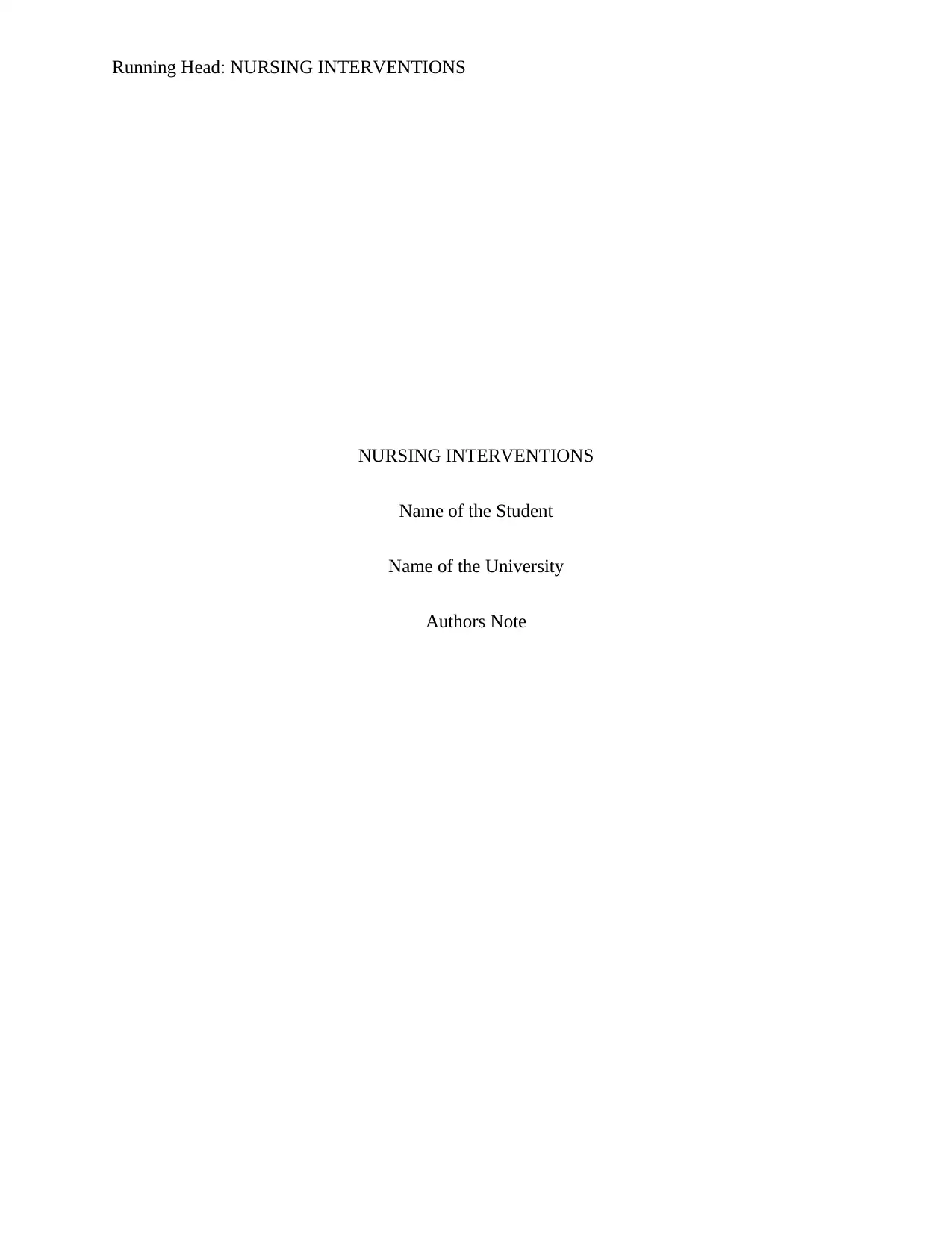
Running Head: NURSING INTERVENTIONS
NURSING INTERVENTIONS
Name of the Student
Name of the University
Authors Note
NURSING INTERVENTIONS
Name of the Student
Name of the University
Authors Note
Paraphrase This Document
Need a fresh take? Get an instant paraphrase of this document with our AI Paraphraser
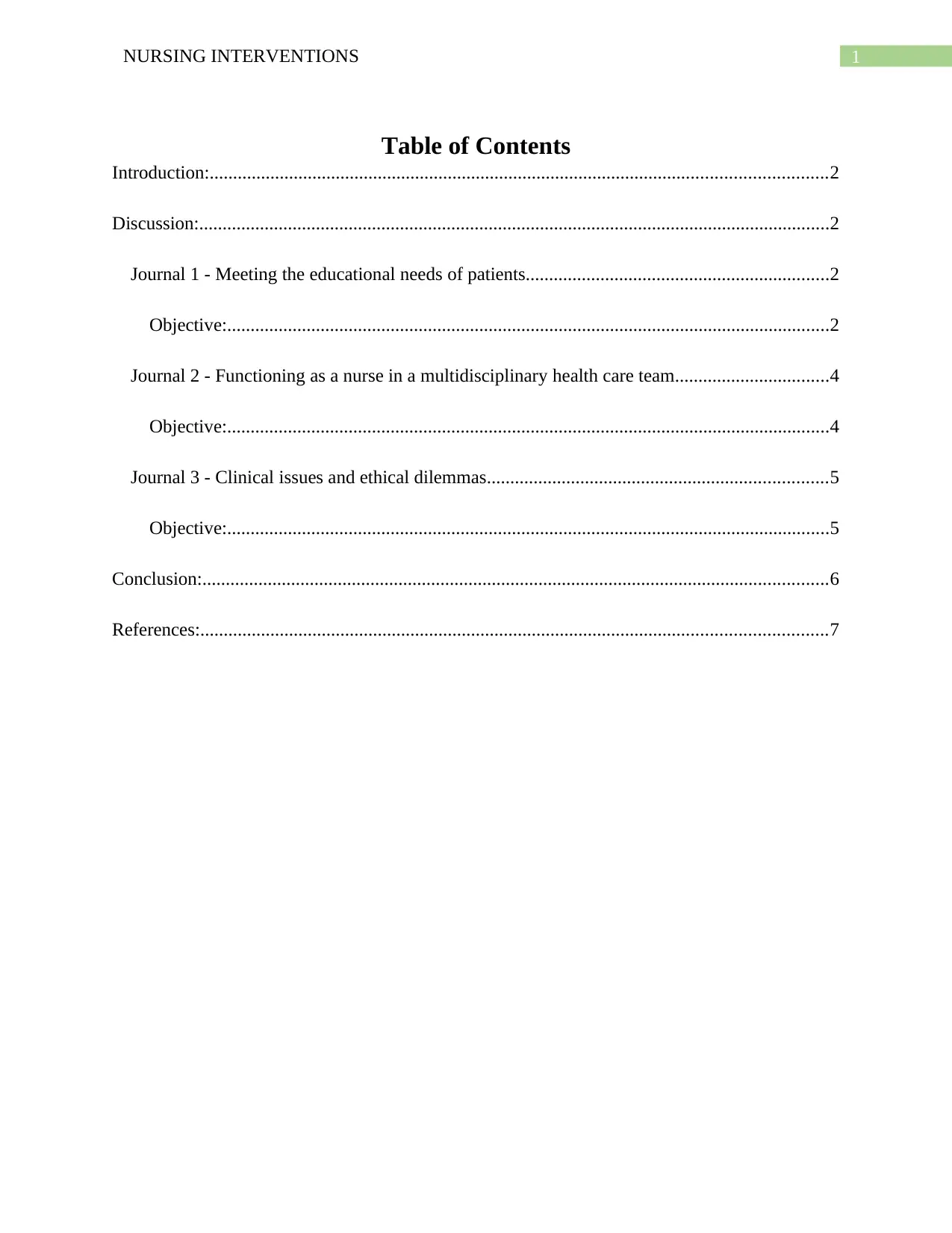
1NURSING INTERVENTIONS
Table of Contents
Introduction:....................................................................................................................................2
Discussion:.......................................................................................................................................2
Journal 1 - Meeting the educational needs of patients.................................................................2
Objective:.................................................................................................................................2
Journal 2 - Functioning as a nurse in a multidisciplinary health care team.................................4
Objective:.................................................................................................................................4
Journal 3 - Clinical issues and ethical dilemmas.........................................................................5
Objective:.................................................................................................................................5
Conclusion:......................................................................................................................................6
References:......................................................................................................................................7
Table of Contents
Introduction:....................................................................................................................................2
Discussion:.......................................................................................................................................2
Journal 1 - Meeting the educational needs of patients.................................................................2
Objective:.................................................................................................................................2
Journal 2 - Functioning as a nurse in a multidisciplinary health care team.................................4
Objective:.................................................................................................................................4
Journal 3 - Clinical issues and ethical dilemmas.........................................................................5
Objective:.................................................................................................................................5
Conclusion:......................................................................................................................................6
References:......................................................................................................................................7
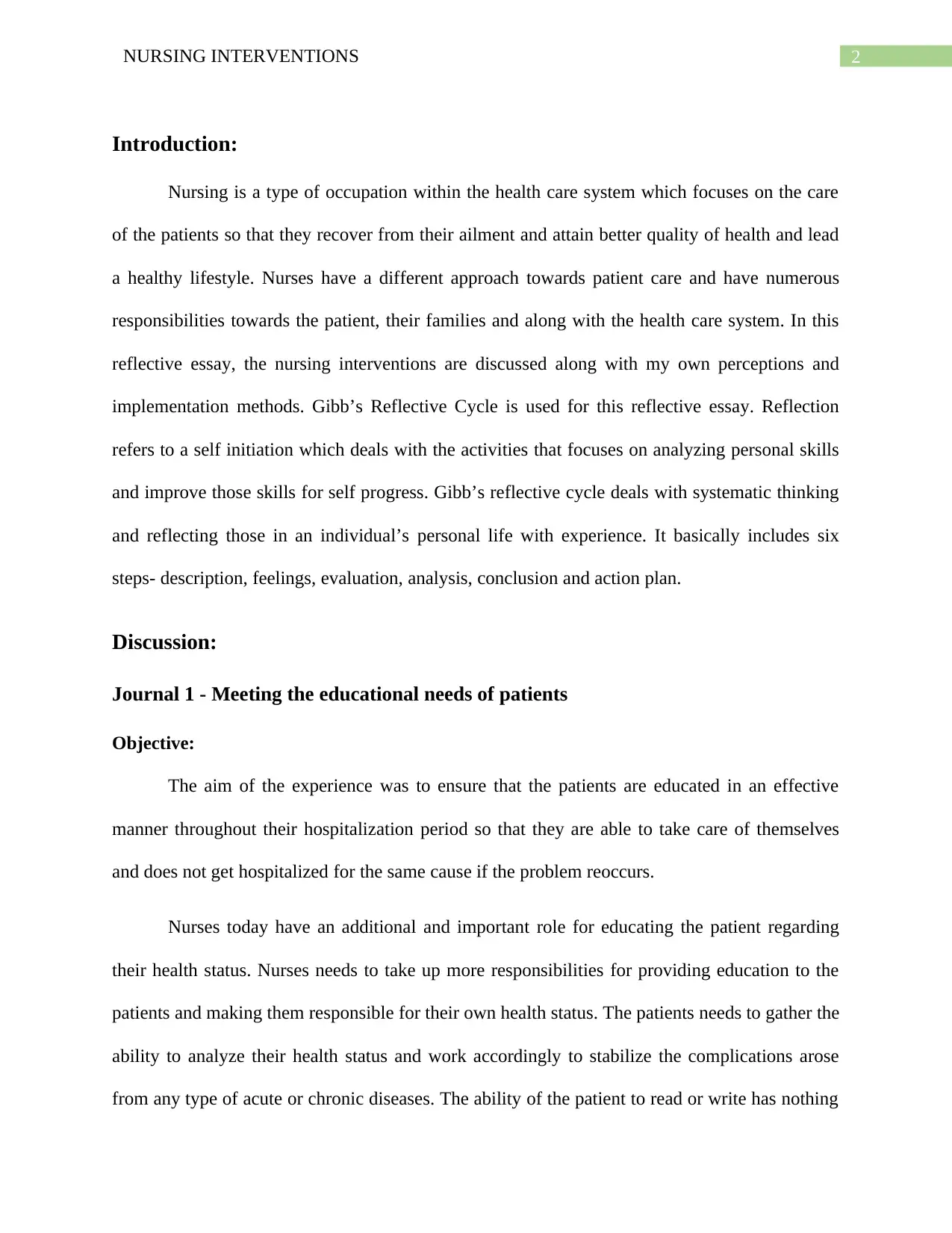
2NURSING INTERVENTIONS
Introduction:
Nursing is a type of occupation within the health care system which focuses on the care
of the patients so that they recover from their ailment and attain better quality of health and lead
a healthy lifestyle. Nurses have a different approach towards patient care and have numerous
responsibilities towards the patient, their families and along with the health care system. In this
reflective essay, the nursing interventions are discussed along with my own perceptions and
implementation methods. Gibb’s Reflective Cycle is used for this reflective essay. Reflection
refers to a self initiation which deals with the activities that focuses on analyzing personal skills
and improve those skills for self progress. Gibb’s reflective cycle deals with systematic thinking
and reflecting those in an individual’s personal life with experience. It basically includes six
steps- description, feelings, evaluation, analysis, conclusion and action plan.
Discussion:
Journal 1 - Meeting the educational needs of patients
Objective:
The aim of the experience was to ensure that the patients are educated in an effective
manner throughout their hospitalization period so that they are able to take care of themselves
and does not get hospitalized for the same cause if the problem reoccurs.
Nurses today have an additional and important role for educating the patient regarding
their health status. Nurses needs to take up more responsibilities for providing education to the
patients and making them responsible for their own health status. The patients needs to gather the
ability to analyze their health status and work accordingly to stabilize the complications arose
from any type of acute or chronic diseases. The ability of the patient to read or write has nothing
Introduction:
Nursing is a type of occupation within the health care system which focuses on the care
of the patients so that they recover from their ailment and attain better quality of health and lead
a healthy lifestyle. Nurses have a different approach towards patient care and have numerous
responsibilities towards the patient, their families and along with the health care system. In this
reflective essay, the nursing interventions are discussed along with my own perceptions and
implementation methods. Gibb’s Reflective Cycle is used for this reflective essay. Reflection
refers to a self initiation which deals with the activities that focuses on analyzing personal skills
and improve those skills for self progress. Gibb’s reflective cycle deals with systematic thinking
and reflecting those in an individual’s personal life with experience. It basically includes six
steps- description, feelings, evaluation, analysis, conclusion and action plan.
Discussion:
Journal 1 - Meeting the educational needs of patients
Objective:
The aim of the experience was to ensure that the patients are educated in an effective
manner throughout their hospitalization period so that they are able to take care of themselves
and does not get hospitalized for the same cause if the problem reoccurs.
Nurses today have an additional and important role for educating the patient regarding
their health status. Nurses needs to take up more responsibilities for providing education to the
patients and making them responsible for their own health status. The patients needs to gather the
ability to analyze their health status and work accordingly to stabilize the complications arose
from any type of acute or chronic diseases. The ability of the patient to read or write has nothing
⊘ This is a preview!⊘
Do you want full access?
Subscribe today to unlock all pages.

Trusted by 1+ million students worldwide
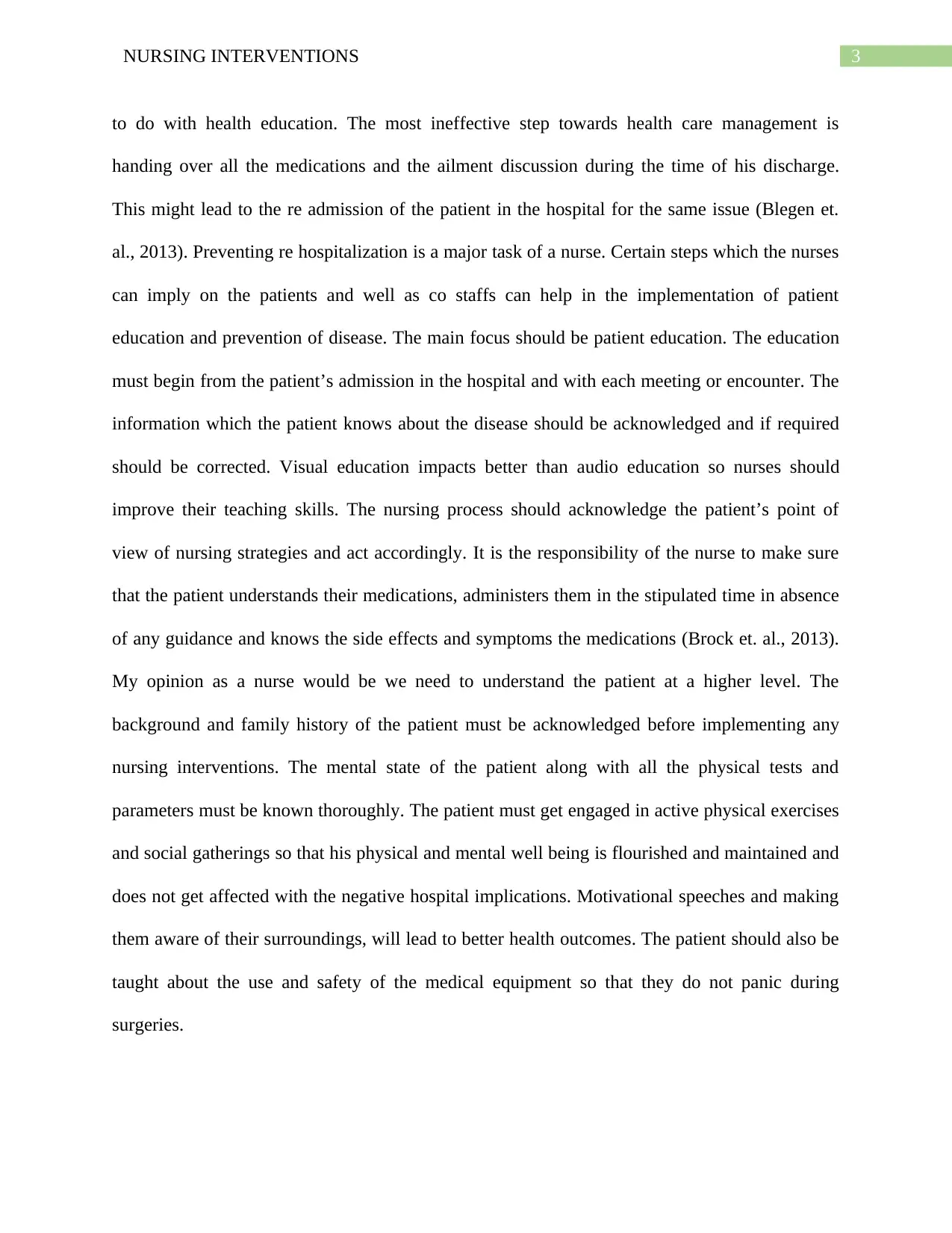
3NURSING INTERVENTIONS
to do with health education. The most ineffective step towards health care management is
handing over all the medications and the ailment discussion during the time of his discharge.
This might lead to the re admission of the patient in the hospital for the same issue (Blegen et.
al., 2013). Preventing re hospitalization is a major task of a nurse. Certain steps which the nurses
can imply on the patients and well as co staffs can help in the implementation of patient
education and prevention of disease. The main focus should be patient education. The education
must begin from the patient’s admission in the hospital and with each meeting or encounter. The
information which the patient knows about the disease should be acknowledged and if required
should be corrected. Visual education impacts better than audio education so nurses should
improve their teaching skills. The nursing process should acknowledge the patient’s point of
view of nursing strategies and act accordingly. It is the responsibility of the nurse to make sure
that the patient understands their medications, administers them in the stipulated time in absence
of any guidance and knows the side effects and symptoms the medications (Brock et. al., 2013).
My opinion as a nurse would be we need to understand the patient at a higher level. The
background and family history of the patient must be acknowledged before implementing any
nursing interventions. The mental state of the patient along with all the physical tests and
parameters must be known thoroughly. The patient must get engaged in active physical exercises
and social gatherings so that his physical and mental well being is flourished and maintained and
does not get affected with the negative hospital implications. Motivational speeches and making
them aware of their surroundings, will lead to better health outcomes. The patient should also be
taught about the use and safety of the medical equipment so that they do not panic during
surgeries.
to do with health education. The most ineffective step towards health care management is
handing over all the medications and the ailment discussion during the time of his discharge.
This might lead to the re admission of the patient in the hospital for the same issue (Blegen et.
al., 2013). Preventing re hospitalization is a major task of a nurse. Certain steps which the nurses
can imply on the patients and well as co staffs can help in the implementation of patient
education and prevention of disease. The main focus should be patient education. The education
must begin from the patient’s admission in the hospital and with each meeting or encounter. The
information which the patient knows about the disease should be acknowledged and if required
should be corrected. Visual education impacts better than audio education so nurses should
improve their teaching skills. The nursing process should acknowledge the patient’s point of
view of nursing strategies and act accordingly. It is the responsibility of the nurse to make sure
that the patient understands their medications, administers them in the stipulated time in absence
of any guidance and knows the side effects and symptoms the medications (Brock et. al., 2013).
My opinion as a nurse would be we need to understand the patient at a higher level. The
background and family history of the patient must be acknowledged before implementing any
nursing interventions. The mental state of the patient along with all the physical tests and
parameters must be known thoroughly. The patient must get engaged in active physical exercises
and social gatherings so that his physical and mental well being is flourished and maintained and
does not get affected with the negative hospital implications. Motivational speeches and making
them aware of their surroundings, will lead to better health outcomes. The patient should also be
taught about the use and safety of the medical equipment so that they do not panic during
surgeries.
Paraphrase This Document
Need a fresh take? Get an instant paraphrase of this document with our AI Paraphraser
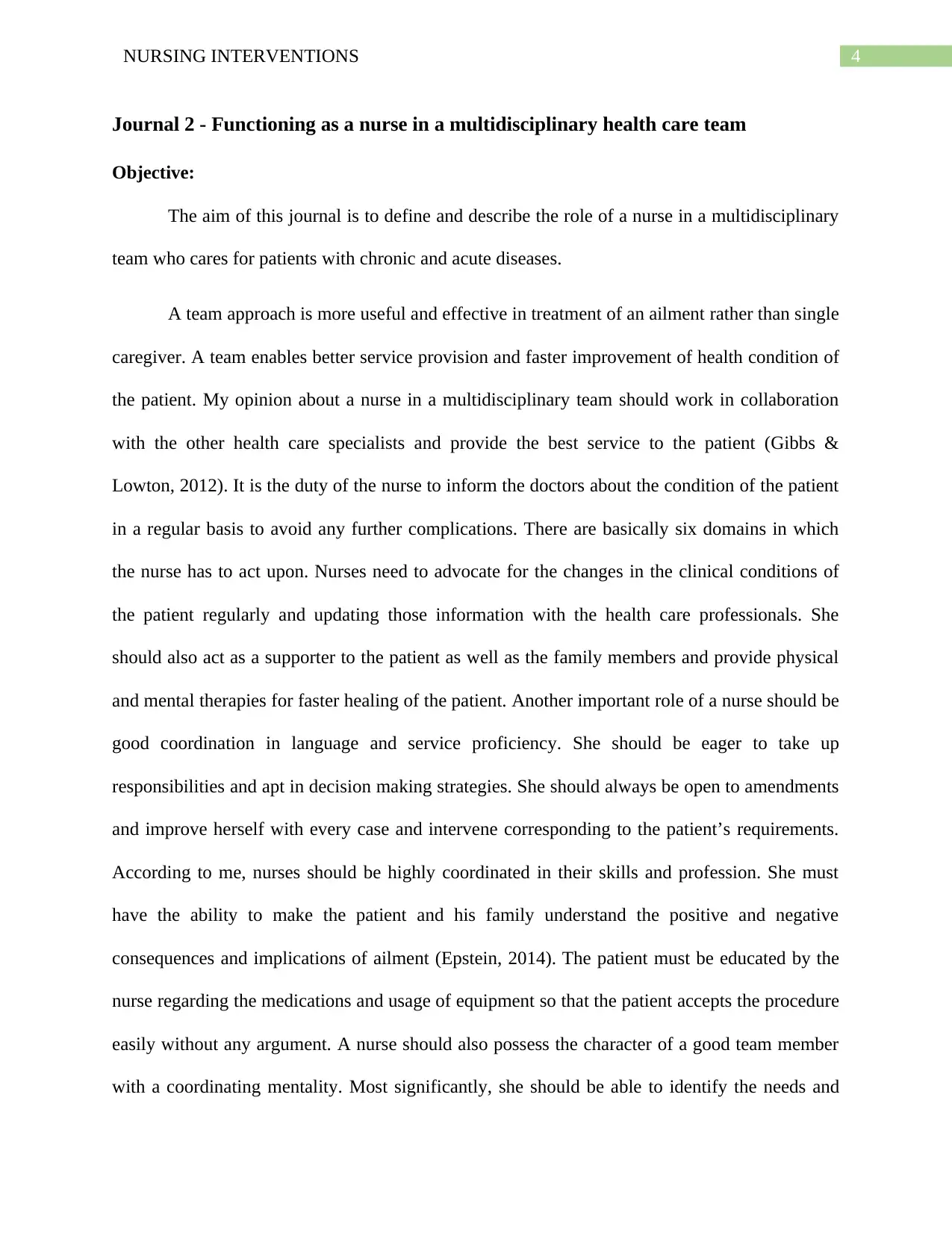
4NURSING INTERVENTIONS
Journal 2 - Functioning as a nurse in a multidisciplinary health care team
Objective:
The aim of this journal is to define and describe the role of a nurse in a multidisciplinary
team who cares for patients with chronic and acute diseases.
A team approach is more useful and effective in treatment of an ailment rather than single
caregiver. A team enables better service provision and faster improvement of health condition of
the patient. My opinion about a nurse in a multidisciplinary team should work in collaboration
with the other health care specialists and provide the best service to the patient (Gibbs &
Lowton, 2012). It is the duty of the nurse to inform the doctors about the condition of the patient
in a regular basis to avoid any further complications. There are basically six domains in which
the nurse has to act upon. Nurses need to advocate for the changes in the clinical conditions of
the patient regularly and updating those information with the health care professionals. She
should also act as a supporter to the patient as well as the family members and provide physical
and mental therapies for faster healing of the patient. Another important role of a nurse should be
good coordination in language and service proficiency. She should be eager to take up
responsibilities and apt in decision making strategies. She should always be open to amendments
and improve herself with every case and intervene corresponding to the patient’s requirements.
According to me, nurses should be highly coordinated in their skills and profession. She must
have the ability to make the patient and his family understand the positive and negative
consequences and implications of ailment (Epstein, 2014). The patient must be educated by the
nurse regarding the medications and usage of equipment so that the patient accepts the procedure
easily without any argument. A nurse should also possess the character of a good team member
with a coordinating mentality. Most significantly, she should be able to identify the needs and
Journal 2 - Functioning as a nurse in a multidisciplinary health care team
Objective:
The aim of this journal is to define and describe the role of a nurse in a multidisciplinary
team who cares for patients with chronic and acute diseases.
A team approach is more useful and effective in treatment of an ailment rather than single
caregiver. A team enables better service provision and faster improvement of health condition of
the patient. My opinion about a nurse in a multidisciplinary team should work in collaboration
with the other health care specialists and provide the best service to the patient (Gibbs &
Lowton, 2012). It is the duty of the nurse to inform the doctors about the condition of the patient
in a regular basis to avoid any further complications. There are basically six domains in which
the nurse has to act upon. Nurses need to advocate for the changes in the clinical conditions of
the patient regularly and updating those information with the health care professionals. She
should also act as a supporter to the patient as well as the family members and provide physical
and mental therapies for faster healing of the patient. Another important role of a nurse should be
good coordination in language and service proficiency. She should be eager to take up
responsibilities and apt in decision making strategies. She should always be open to amendments
and improve herself with every case and intervene corresponding to the patient’s requirements.
According to me, nurses should be highly coordinated in their skills and profession. She must
have the ability to make the patient and his family understand the positive and negative
consequences and implications of ailment (Epstein, 2014). The patient must be educated by the
nurse regarding the medications and usage of equipment so that the patient accepts the procedure
easily without any argument. A nurse should also possess the character of a good team member
with a coordinating mentality. Most significantly, she should be able to identify the needs and
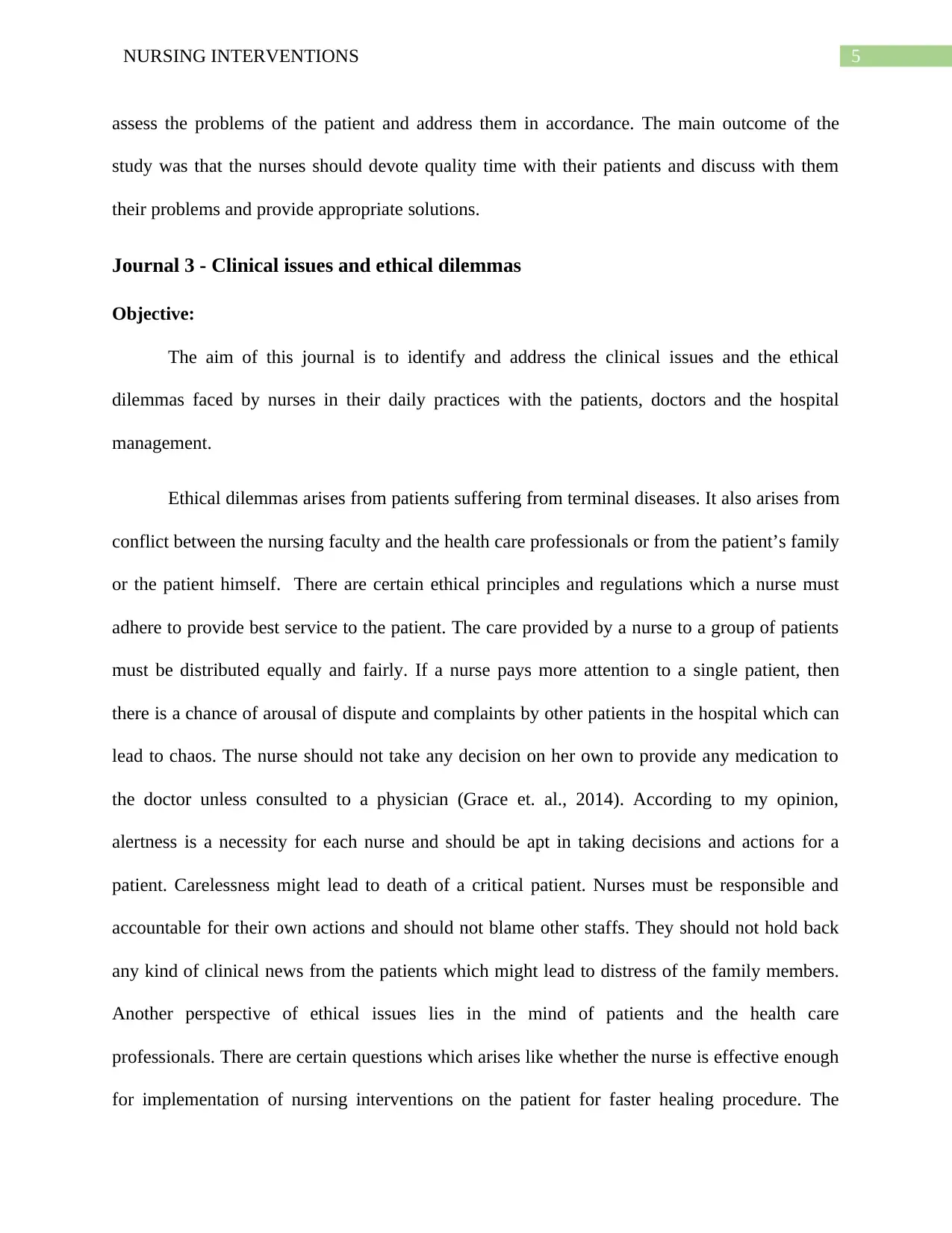
5NURSING INTERVENTIONS
assess the problems of the patient and address them in accordance. The main outcome of the
study was that the nurses should devote quality time with their patients and discuss with them
their problems and provide appropriate solutions.
Journal 3 - Clinical issues and ethical dilemmas
Objective:
The aim of this journal is to identify and address the clinical issues and the ethical
dilemmas faced by nurses in their daily practices with the patients, doctors and the hospital
management.
Ethical dilemmas arises from patients suffering from terminal diseases. It also arises from
conflict between the nursing faculty and the health care professionals or from the patient’s family
or the patient himself. There are certain ethical principles and regulations which a nurse must
adhere to provide best service to the patient. The care provided by a nurse to a group of patients
must be distributed equally and fairly. If a nurse pays more attention to a single patient, then
there is a chance of arousal of dispute and complaints by other patients in the hospital which can
lead to chaos. The nurse should not take any decision on her own to provide any medication to
the doctor unless consulted to a physician (Grace et. al., 2014). According to my opinion,
alertness is a necessity for each nurse and should be apt in taking decisions and actions for a
patient. Carelessness might lead to death of a critical patient. Nurses must be responsible and
accountable for their own actions and should not blame other staffs. They should not hold back
any kind of clinical news from the patients which might lead to distress of the family members.
Another perspective of ethical issues lies in the mind of patients and the health care
professionals. There are certain questions which arises like whether the nurse is effective enough
for implementation of nursing interventions on the patient for faster healing procedure. The
assess the problems of the patient and address them in accordance. The main outcome of the
study was that the nurses should devote quality time with their patients and discuss with them
their problems and provide appropriate solutions.
Journal 3 - Clinical issues and ethical dilemmas
Objective:
The aim of this journal is to identify and address the clinical issues and the ethical
dilemmas faced by nurses in their daily practices with the patients, doctors and the hospital
management.
Ethical dilemmas arises from patients suffering from terminal diseases. It also arises from
conflict between the nursing faculty and the health care professionals or from the patient’s family
or the patient himself. There are certain ethical principles and regulations which a nurse must
adhere to provide best service to the patient. The care provided by a nurse to a group of patients
must be distributed equally and fairly. If a nurse pays more attention to a single patient, then
there is a chance of arousal of dispute and complaints by other patients in the hospital which can
lead to chaos. The nurse should not take any decision on her own to provide any medication to
the doctor unless consulted to a physician (Grace et. al., 2014). According to my opinion,
alertness is a necessity for each nurse and should be apt in taking decisions and actions for a
patient. Carelessness might lead to death of a critical patient. Nurses must be responsible and
accountable for their own actions and should not blame other staffs. They should not hold back
any kind of clinical news from the patients which might lead to distress of the family members.
Another perspective of ethical issues lies in the mind of patients and the health care
professionals. There are certain questions which arises like whether the nurse is effective enough
for implementation of nursing interventions on the patient for faster healing procedure. The
⊘ This is a preview!⊘
Do you want full access?
Subscribe today to unlock all pages.

Trusted by 1+ million students worldwide
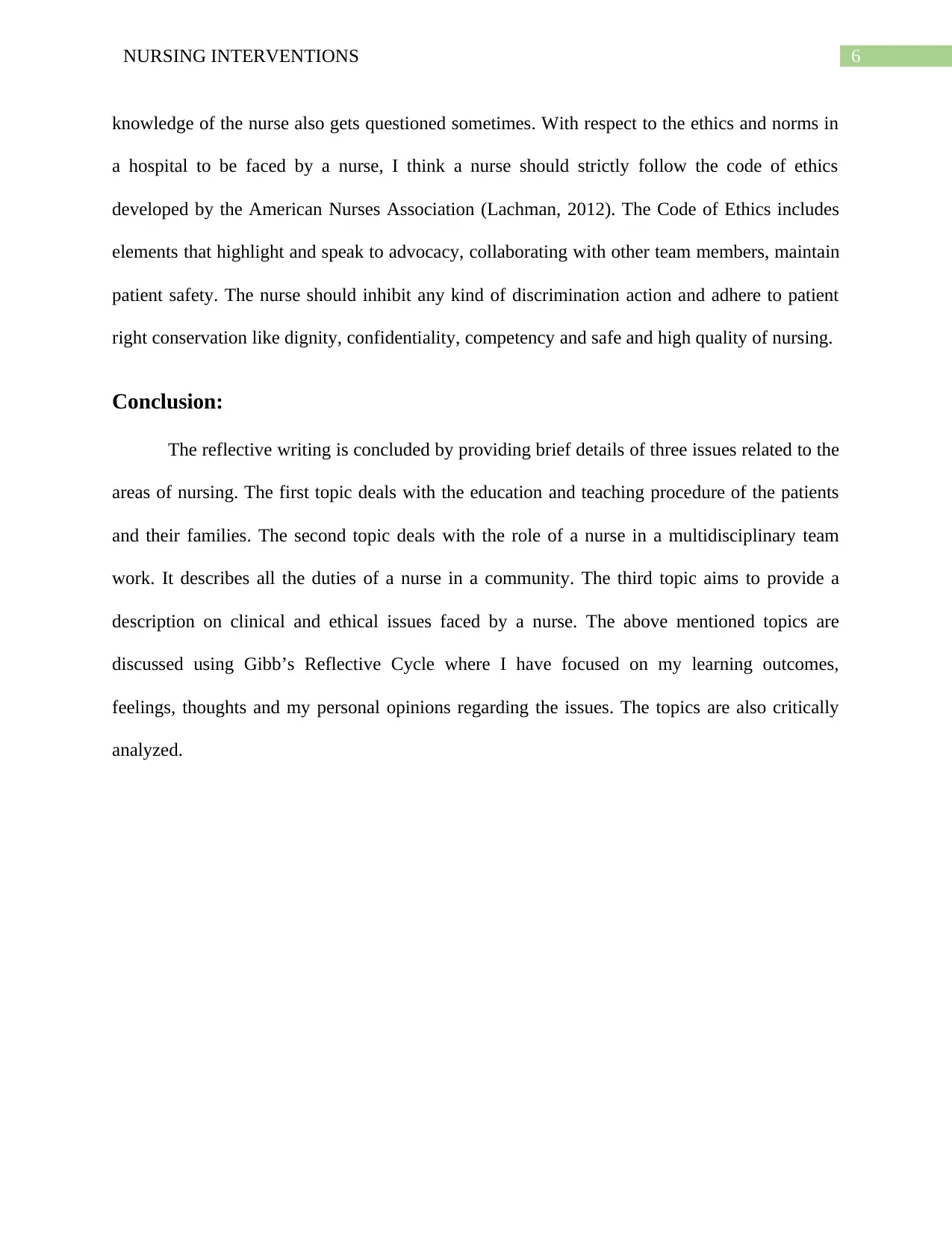
6NURSING INTERVENTIONS
knowledge of the nurse also gets questioned sometimes. With respect to the ethics and norms in
a hospital to be faced by a nurse, I think a nurse should strictly follow the code of ethics
developed by the American Nurses Association (Lachman, 2012). The Code of Ethics includes
elements that highlight and speak to advocacy, collaborating with other team members, maintain
patient safety. The nurse should inhibit any kind of discrimination action and adhere to patient
right conservation like dignity, confidentiality, competency and safe and high quality of nursing.
Conclusion:
The reflective writing is concluded by providing brief details of three issues related to the
areas of nursing. The first topic deals with the education and teaching procedure of the patients
and their families. The second topic deals with the role of a nurse in a multidisciplinary team
work. It describes all the duties of a nurse in a community. The third topic aims to provide a
description on clinical and ethical issues faced by a nurse. The above mentioned topics are
discussed using Gibb’s Reflective Cycle where I have focused on my learning outcomes,
feelings, thoughts and my personal opinions regarding the issues. The topics are also critically
analyzed.
knowledge of the nurse also gets questioned sometimes. With respect to the ethics and norms in
a hospital to be faced by a nurse, I think a nurse should strictly follow the code of ethics
developed by the American Nurses Association (Lachman, 2012). The Code of Ethics includes
elements that highlight and speak to advocacy, collaborating with other team members, maintain
patient safety. The nurse should inhibit any kind of discrimination action and adhere to patient
right conservation like dignity, confidentiality, competency and safe and high quality of nursing.
Conclusion:
The reflective writing is concluded by providing brief details of three issues related to the
areas of nursing. The first topic deals with the education and teaching procedure of the patients
and their families. The second topic deals with the role of a nurse in a multidisciplinary team
work. It describes all the duties of a nurse in a community. The third topic aims to provide a
description on clinical and ethical issues faced by a nurse. The above mentioned topics are
discussed using Gibb’s Reflective Cycle where I have focused on my learning outcomes,
feelings, thoughts and my personal opinions regarding the issues. The topics are also critically
analyzed.
Paraphrase This Document
Need a fresh take? Get an instant paraphrase of this document with our AI Paraphraser
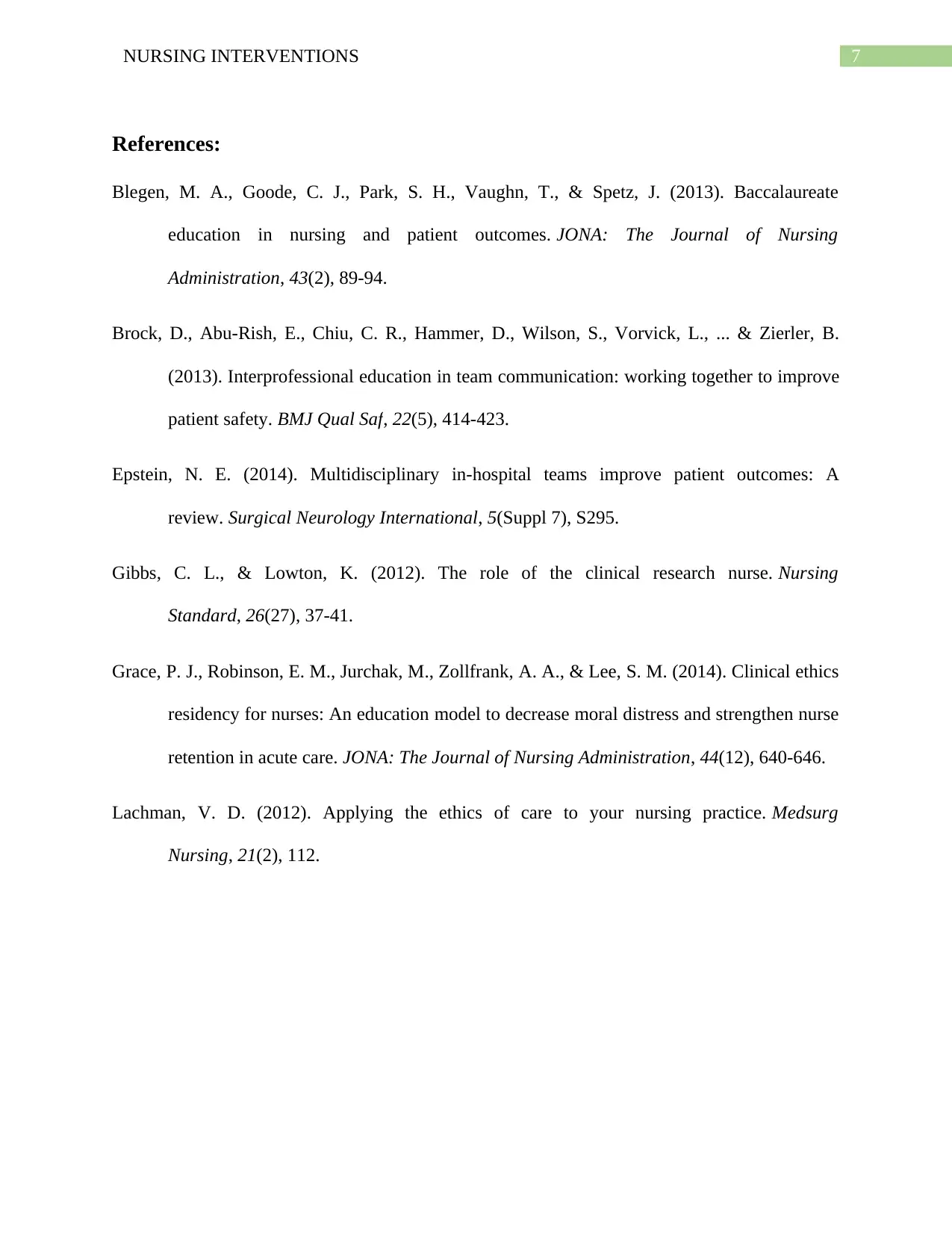
7NURSING INTERVENTIONS
References:
Blegen, M. A., Goode, C. J., Park, S. H., Vaughn, T., & Spetz, J. (2013). Baccalaureate
education in nursing and patient outcomes. JONA: The Journal of Nursing
Administration, 43(2), 89-94.
Brock, D., Abu-Rish, E., Chiu, C. R., Hammer, D., Wilson, S., Vorvick, L., ... & Zierler, B.
(2013). Interprofessional education in team communication: working together to improve
patient safety. BMJ Qual Saf, 22(5), 414-423.
Epstein, N. E. (2014). Multidisciplinary in-hospital teams improve patient outcomes: A
review. Surgical Neurology International, 5(Suppl 7), S295.
Gibbs, C. L., & Lowton, K. (2012). The role of the clinical research nurse. Nursing
Standard, 26(27), 37-41.
Grace, P. J., Robinson, E. M., Jurchak, M., Zollfrank, A. A., & Lee, S. M. (2014). Clinical ethics
residency for nurses: An education model to decrease moral distress and strengthen nurse
retention in acute care. JONA: The Journal of Nursing Administration, 44(12), 640-646.
Lachman, V. D. (2012). Applying the ethics of care to your nursing practice. Medsurg
Nursing, 21(2), 112.
References:
Blegen, M. A., Goode, C. J., Park, S. H., Vaughn, T., & Spetz, J. (2013). Baccalaureate
education in nursing and patient outcomes. JONA: The Journal of Nursing
Administration, 43(2), 89-94.
Brock, D., Abu-Rish, E., Chiu, C. R., Hammer, D., Wilson, S., Vorvick, L., ... & Zierler, B.
(2013). Interprofessional education in team communication: working together to improve
patient safety. BMJ Qual Saf, 22(5), 414-423.
Epstein, N. E. (2014). Multidisciplinary in-hospital teams improve patient outcomes: A
review. Surgical Neurology International, 5(Suppl 7), S295.
Gibbs, C. L., & Lowton, K. (2012). The role of the clinical research nurse. Nursing
Standard, 26(27), 37-41.
Grace, P. J., Robinson, E. M., Jurchak, M., Zollfrank, A. A., & Lee, S. M. (2014). Clinical ethics
residency for nurses: An education model to decrease moral distress and strengthen nurse
retention in acute care. JONA: The Journal of Nursing Administration, 44(12), 640-646.
Lachman, V. D. (2012). Applying the ethics of care to your nursing practice. Medsurg
Nursing, 21(2), 112.
1 out of 8
Related Documents
Your All-in-One AI-Powered Toolkit for Academic Success.
+13062052269
info@desklib.com
Available 24*7 on WhatsApp / Email
![[object Object]](/_next/static/media/star-bottom.7253800d.svg)
Unlock your academic potential
Copyright © 2020–2026 A2Z Services. All Rights Reserved. Developed and managed by ZUCOL.





